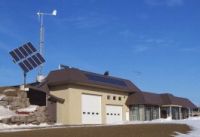Should you retrofit your home with solar power? The short answers are: probably (for your hot-water); definitely (for your pool); and likely not (for your household electrical needs).

Solar – bettar watar heatar
Water Heating
Your hot-water heater is an energy hog, accounting for up to one-quarter of your household’s energy consumption. Add greenhouse gas emissions associated with conventional hot water heating – between 600 and 760 kilograms a year – and endlessly renewable, non-polluting sunshine seems a no-brainer.
Quallium, an Ottawa-based startup company, has installed solar electricity systems for clients hungering to go off-grid. The systems are especially practical for cottages far from hydro lines, says company owner Paul Fritz-Nemeth.
“People think the cost of solar systems depends on the size of their house. It really depends on what your habits are.” says Fritz-Nemeth. “Big-screen TVs consume a lot of power, especially when they’re left plugged in all the time.”
A solar hot-water system for a family of four needs a couple of glycol-filled collector panels installed, preferably, on a south-facing roof. Installation involves a couple of technicians clambering over your roof and through your basement for about a day and a half and you’ll also need a municipal building permit.
Heavily insulated copper pipes carry the heated glycol from the panels down the outside of the house and into the basement, where a new hot-water tank with a heat exchanger feeds your existing unit. For optimal operation, the panels need direct sun from 10 a.m. to 2 p.m. every day, although the storage tank does hold the heat for up to 24 hours. The water is hottest in late morning and early afternoon.
“From April to September, solar power will cover 90 per cent of your heating,” said Michael McGahern, whose company, Ottawa Solar Power, sells, installs and services solar hot-water systems. “From June to September, it’ll be 100 per cent.” Factor in cloudy days and cooler temperatures through the balance of the year, and a solar power system will meet 50 to 60 per cent of your annual hot water needs.
“When the sun shines, your hot water’s free; when it doesn’t, your electrical or gas-fired tank kicks in.”
A system for a family of four runs around $6,500, according to McGahern. With federal and provincial grants and rebates factored in, the system should have paid for itself in seven to eight years, he says. But if energy prices increase, as some predict they will, it should pay for itself more quickly than that.
“The single best use of solar energy is heating your pool,” McGahern said. “It can pay for itself within a year, a year and a half.”
A system runs between $3,000 and $5,000 and, like conventional pool heating, extends the swimming season by two to four weeks at both ends. These systems typically work by pumping the pool water through solar panels. Like other systems, components are usually long-lasting and low-maintenance.
Electrical
A typical Canadian household consumes 20 to 30 kWh of electricity a day, while even an ultra-efficient home uses three to six, so as far as switiching to solar-generated residential electricity, McGahern said, “People putting in those systems are doing it from an environmental point of view, not an economic one.”
While a $5,000 to $10,000 system can provide backup for critical household circuits to run furnace pumps and other basic equipment during a power failure, according to the experts, a full solar-based electricity-generating system with its array of sun-tracking photovoltaic panels, energy inverters and batteries will cost $30,000 and up for every 3 kW it produces.
What’s more, homeowners usually have to pay for a backup generator or stay hooked to the hydro grid for those back-to-back days of cloud cover. McGahern faults Canadian governments for short-sightedness in not subsidizing solar technology as some European countries do.
“Through subsidies, they’ve spawned a multi-billion-dollar industry which is feeding those countries. They developed a tremendous amount of knowledge which is going to benefit all of us 10 years from now.”
Canada Mortgage and Housing Corp. and Natural Resources Canada are good sources of information on most things solar.
